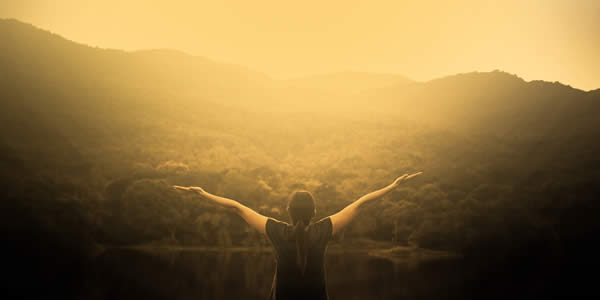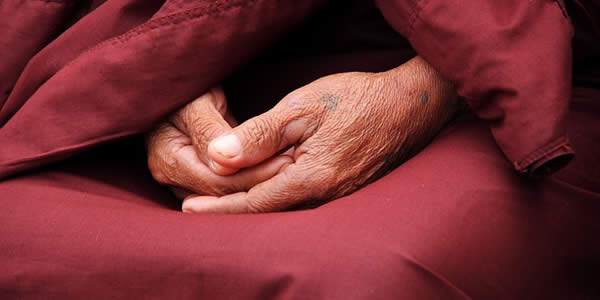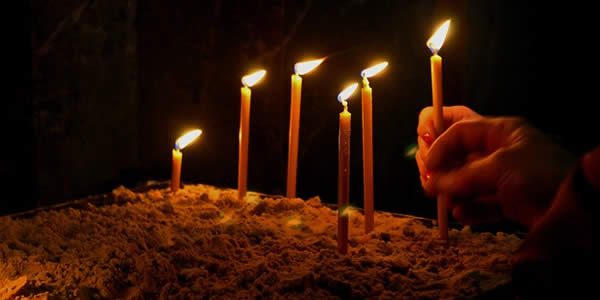But it does me no injury for my neighbor to say there are twenty gods or no God. It neither picks my pocket nor breaks my leg.
-Thomas Jefferson, Notes on Virginia, 1782
I fear that I’m about to make myself terribly unpopular with folks on all sides of this argument.
I don’t care what people believe regarding the Gods. I don’t think that a person’s belief feeds the Gods; I don’t think that their lack of belief starves them. I am a polytheist; I believe that the Gods all exist as separate beings; either “large” spirits or a host of spirits who bear the same title and wear the same hats or masks. I am also believe that everything is part of the same thing, and that there may be an underlying will or consciousness to that everything but I don’t refer to that consciousness as a God. That may mean that the Gods are, in the end, all one, but it also means that all people are as well, and that we are one with the Gods and all of the other amazing things in creation, all part of a vast web of being.

Because of this belief, I don’t act as though all Gods are one any more than I act as though all people are one. It would be confusing and upsetting if I went around calling everyone Laine; I feel that I owe the Gods the same courtesy. I also don’t think that the universal consciousness is something that we can interact with terribly well. We can feel it, and from this come the mystical experiences that so many people of different faiths and paths have when a person feels an intimate and ultimate oneness with All That Is. I think that that can be a positive experience (one which Gods can help guide people to, certainly) because it provides us with a much-needed perspective at times in our journey when we feel small, alone, and separated. It changes the way that we see the world and our place in it, and is beneficial for that reason.
However, I don’t believe that All That Is is particularly good at talking back, at answering prayers, or at guiding us directly. We are a very small part of its incalculable vastness. Being brought into alignment with it briefly may be a healing, empowering experience, but I don’t think that it’s the power that you go to when you need help with your personal life or even to change the world on the slightly grander scale that is the upper limit of our imaginations.
I’ve explained some of the rest of my theology elsewhere. I’m giving a broader view of it here to help cast perspective on what I want to say.

I have a feeling that most if not all people have experiences that involve the Powers. We get nudges and pushes, we have bizarre coincidences and odd visitations. We may or may not notice them, and they may or may not occur in line with our attempts to create or interact with them. Sometimes they come unbidden, sometimes no one answers the door when you knock. People expecting absolute, regular consistency from interaction with Gods or spirits don’t take into account the possibility that they are likewise complex beings and sometimes they are busy, sometimes they don’t agree with our requests and possibly sometimes they don’t care.
How we interpret those experiences is up to us. The different shades of theism, from a- to poly- and all the colors in between and outside are the filters that we use to understand these experiences. An atheist or deist may see the clockwork actions of a mechanistic universe while a panentheist or pantheist may see the dance of a living, aware one. A polytheist may see the Gods’ fingers in the pies of their lives while a monist may witness a single God with a great many fingers. We argue endlessly about whose interpretation is correct because feeling that we understand something makes it less frightening to us. Understanding means that we can, perhaps, have some control over the experience, even if it is just our own perceptions of and reactions to it.
There is precedent in the ancient world for many different beliefs regarding the nature of the Gods. We have the deified/mythologized ancestors of Euhemerism, we have the deistic and materialistic atomism of Epicurus, we have the different interpretations that we’ve drawn from the (possibly more than) 4000 years of Kemetic (Egyptian) belief and its later Hellenic syncretisms. We find writers speaking of pantheism, panentheism, hard and soft polytheism, deism, monism, monotheism… and yes, atheism as well. These people more often than not practiced the religion of their tribe and state, and held different opinions on what the nature of the Gods that were spoken about in the rites actually were.

Anyone can tell you what they think the Gods are. No one can tell you what they actually are, despite the ardent assertions of true believers of every stripe (including polytheists and atheists). We’re not certain, because what they are is greater than us. When we look at the earth, all we see is flat plains and mountains; it took us a long time to come to a generally-accepted understanding of its curvature. The earth is something that we all have in common; we can’t fail to see and interact with it. Though I believe that we all do have the Gods in common, and interact with them, their nature is obviously more subtle since after so many thousands of years of interaction and recording our thoughts on them we’re still arguing about it.
I have grown comfortable with that uncertainty. There is a freedom that comes of knowing what you do not know, and being aware of your limitations even if you seek to still overcome them. In some ways I’ve learned to thrive on it; I deeply distrust certainty of anything in anyone and find pleasure when people admit that they do not know a thing for certain. I developed this comfort in my own struggles with theism and nihilism, with fear of Nothing and Meaninglessness and existential angst. The balms that healed my soul included wandering in nature and writing about what I saw and embracing the reality that I don’t know anything for certain, and likely never will. Out of this agnosticism and naturalism my polytheism emerged, because it was the assumption (not knowledge) that makes the most sense to how I’ve come to see myself and everything else as being a part of a vast, dancing cosmos and existence. It’s a cosmos where there are no true boundaries, merely zones of gradation demarcating zones of relative purity. It’s a cosmos where there is room for afterlife and material decomposition, land-spirits and wide-scale geological activity, Gods and galaxies, and more besides. It’s an inclusive worldview, and one whose boundaries may change with new information and experiences.

Our Paganism is not a strictly religious or theological movement. That ship sailed long ago as even some of the big names in the modern Pagan revival were not strict polytheists. Now that our religions are no longer mandates of tribal or state law, there will be those in our tribe or state who will publicly disagree with some of many of the tenets of the dogmas that we set down. They will disagree vocally with our interpretations, they will refuse to partake in some of our rites, and they will occasionally be questioners. It’s good practice to listen to them; I’ve found it to be far more perilous to one’s faith and religion to ignore questions than it is to engage them. If they antagonize or harass once you’ve answered the questions to your own satisfaction (not theirs) then they’re being asses, and it does not reflect poorly upon you to turn your back or ignore the repetitions. They’ve then ceased to be skeptics (which in its basic definition means “questioner”) and have become their opposites, evangelicals and zealots.
The emphasis on “believing” one thing or another to qualify for membership in a group is also something that I find odd. First off, there’s no way to know what another believes beyond what they say. For millenia, Christians who did not agree with Christian dogma (and likewise with Muslims and Islamic dogma) likely simply lied about it rather than face the punishment for saying that they did not agree with another’s interpretation of reality. Pascal’s Wager always baffled me for that reason: saying that you believe something simply for the purpose of pleasing a deity whose existence you are uncertain of is dishonest and self-defeating. Besides, wouldn’t your God know what was truly in your heart? Humans certainly cannot, and in an age and place where the freedom to speak our minds rather than punishment for the same is an ideal that many support, it doesn’t make sense that we should force people to be silent about their thoughts and opinions.
Secondly, I do not think that belief is an action. I think that it’s a matter of our reaction to the world around us and what framework we use to make sense of it. We can choose to try and use different frameworks, but if they do not occur organically but instead are imposed artificially it is merely an intellectual exercise. In other words, you stop believing one thing and start believing another when a deep part of your understanding of your perceptions shift. Trying to force someone to believe something ends in misery, cognitive dissonance, and madness. Most of those escaping from strict modern monotheistic faiths will be familiar with this.
That’s why I don’t believe in a test of faith for modern Paganism in general (although I understand if particular traditions within the Pagan Village might want to maintain it). We have no way to prove what someone thinks about what they experience, and trying forcing them to change their thoughts to conform to the tribes that they identify with is harmful and futile in a way that the major world faiths still have not reconciled themselves with.
What I do believe is helpful is a focus on practice. Is your practice Pagan? Do you put your money where your mouth is? Do you perform rites or prayers or offerings or ceremonies that are generally accepted as Pagan (which is a sticky wicket that we’ll have to discuss elsewhere). We can observe and participate in practices that we don’t agree with; many years of attending painfully (to me) heterosexist Wiccan rites and Pagan rituals that call upon angels from faiths that spit upon ours has taught me that. I attend those rites because I felt a social bond of community with the people involved, just as I attended my maternal grandmother’s Methodist memorial (though because of her deep associations with them in life it had some elements of the funerals of the Upper Skagit people incorporated into it which actually made it more palatable to me). Active practice is more important than passive observation and belief in determining whether or not someone belongs to a social movement, which, at the end of the day, modern Paganism has become.
So, how do we determine if someone is Pagan? Do they join our events and participate in our communities? Do they support our rights to practice and believe as we think that Pagans should? Then I’ll say that they are Pagan. That doesn’t make them a polytheist, nor do I feel it should have to. Trying to control how we see the world is a harmful mistake of our monotheistic forbears that I think we would do well to avoid.

Patheos Pagan on Facebook.

the Agora on Facebook
The Lady’s Quill is published on the second and fourth Thursday of every month. You can subscribe by RSS and e-mail.
Please use the links to the right to keep on top of activities here on the Agora as well as across the entire Patheos Pagan channel.

















